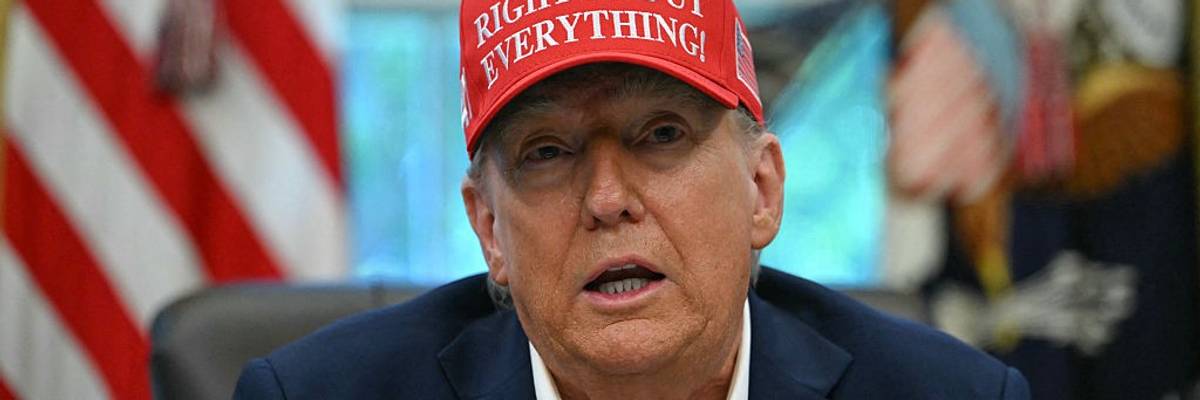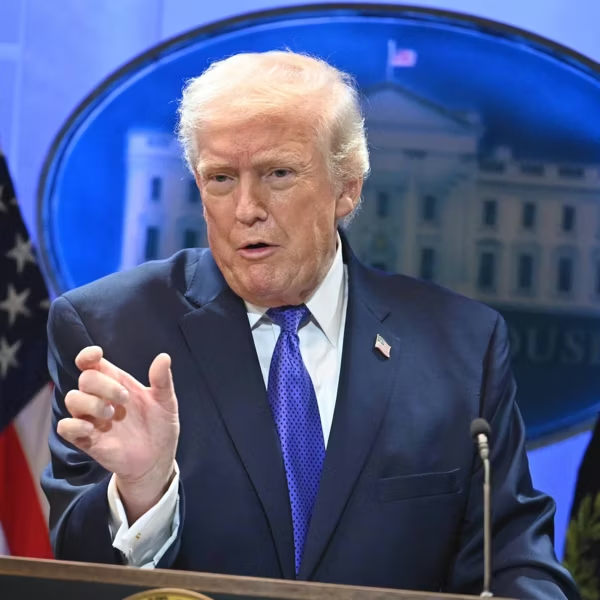
Economists Warn Trump Attack on Fed Will Further Jack Prices for Working Families
"Confidence that the Fed will respond wisely to future periods of macroeconomic stress... will evaporate," warned one economist.
Economists are warning that US President Donald Trump's efforts to meddle with the Federal Reserve are going to wind up raising prices even further on working families.
Michael Madowitz, principal economist at the Roosevelt Institute, said on Wednesday that the president's efforts to strong-arm the US central bank into lowering interest rates by firing Federal Reserve Gov. Lisa Cook would backfire by accelerating inflation.
"The administration's efforts to politicize interest rates—an authoritarian tactic—will ultimately hurt American families by driving up costs," he said. "That helps explain why Fed independence has helped keep inflation under 3%, while, after years of political interference in their central bank, Turkey's inflation rate is over 33%."
Heidi Shierholz, the president of the Economic Policy Institute, said that the president's move to fire Cook "radically undermines what Trump says his own goal is: lowering U.S. interest rates to spur faster economic growth."
She then gave a detailed explanation for why Trump imposing his will on the Federal Reserve would likely bring economic pain.
"Presidential capture of the Fed would signal to decision-makers throughout the economy that interest rates will no longer be set on the basis of sound data or economic conditions—but instead on the whims of the president," she argued. "Confidence that the Fed will respond wisely to future periods of macroeconomic stress—either excess inflation or unemployment—will evaporate."
This lack of confidence, she continued, would manifest in investors in US Treasury bonds demanding higher premiums due to the higher risks they will feel they are taking when buying US debt, which would only further drive up the nation's borrowing costs.
"These higher long-term rates will ripple through the economy—making mortgages, auto loans, and credit card payments higher for working people—and require that rates be held higher for longer to tamp down any future outbreak of inflation," she said. "In the first hours after Trump's announcement, all of these worries seemed to be coming to pass."
Economist Paul Krugman, a former columnist for The New York Times, wrote on his personal Substack page Thursday that Trump's moves to take control of the Federal Reserve were "shocking and terrifying."
"Trump's campaign to take over monetary policy has shifted from a public pressure to personal intimidation of Fed officials: the attack on Cook signals that Trump and his people will try to ruin the life of anyone who stands in his way," he argued. "There is now a substantial chance that the Fed's independence, its ability to manage the nation's monetary policy on an objective, technocratic basis rather than as an instrument of the president's political interests and personal whims, will soon be gone."
The economists' warnings come as economic data released on Friday revealed that core inflation rose to 2.9% in August, which is the highest annual rate recorded since this past February. Earlier this month, the Producer Price Index, which is considered a leading indicator of future inflation, came in at 3.3%, which was significantly higher than economists' consensus estimate of 2.5%.
Data aggregated by polling analyst G. Elliott Morris shows that inflation is far and away Trump's biggest vulnerability, as American voters give him a net approval of -23% on that issue.
An Urgent Message From Our Co-Founder
Dear Common Dreams reader, The U.S. is on a fast track to authoritarianism like nothing I've ever seen. Meanwhile, corporate news outlets are utterly capitulating to Trump, twisting their coverage to avoid drawing his ire while lining up to stuff cash in his pockets. That's why I believe that Common Dreams is doing the best and most consequential reporting that we've ever done. Our small but mighty team is a progressive reporting powerhouse, covering the news every day that the corporate media never will. Our mission has always been simple: To inform. To inspire. And to ignite change for the common good. Now here's the key piece that I want all our readers to understand: None of this would be possible without your financial support. That's not just some fundraising cliche. It's the absolute and literal truth. We don't accept corporate advertising and never will. We don't have a paywall because we don't think people should be blocked from critical news based on their ability to pay. Everything we do is funded by the donations of readers like you. Will you donate now to help power the nonprofit, independent reporting of Common Dreams? Thank you for being a vital member of our community. Together, we can keep independent journalism alive when it’s needed most. - Craig Brown, Co-founder |
Economists are warning that US President Donald Trump's efforts to meddle with the Federal Reserve are going to wind up raising prices even further on working families.
Michael Madowitz, principal economist at the Roosevelt Institute, said on Wednesday that the president's efforts to strong-arm the US central bank into lowering interest rates by firing Federal Reserve Gov. Lisa Cook would backfire by accelerating inflation.
"The administration's efforts to politicize interest rates—an authoritarian tactic—will ultimately hurt American families by driving up costs," he said. "That helps explain why Fed independence has helped keep inflation under 3%, while, after years of political interference in their central bank, Turkey's inflation rate is over 33%."
Heidi Shierholz, the president of the Economic Policy Institute, said that the president's move to fire Cook "radically undermines what Trump says his own goal is: lowering U.S. interest rates to spur faster economic growth."
She then gave a detailed explanation for why Trump imposing his will on the Federal Reserve would likely bring economic pain.
"Presidential capture of the Fed would signal to decision-makers throughout the economy that interest rates will no longer be set on the basis of sound data or economic conditions—but instead on the whims of the president," she argued. "Confidence that the Fed will respond wisely to future periods of macroeconomic stress—either excess inflation or unemployment—will evaporate."
This lack of confidence, she continued, would manifest in investors in US Treasury bonds demanding higher premiums due to the higher risks they will feel they are taking when buying US debt, which would only further drive up the nation's borrowing costs.
"These higher long-term rates will ripple through the economy—making mortgages, auto loans, and credit card payments higher for working people—and require that rates be held higher for longer to tamp down any future outbreak of inflation," she said. "In the first hours after Trump's announcement, all of these worries seemed to be coming to pass."
Economist Paul Krugman, a former columnist for The New York Times, wrote on his personal Substack page Thursday that Trump's moves to take control of the Federal Reserve were "shocking and terrifying."
"Trump's campaign to take over monetary policy has shifted from a public pressure to personal intimidation of Fed officials: the attack on Cook signals that Trump and his people will try to ruin the life of anyone who stands in his way," he argued. "There is now a substantial chance that the Fed's independence, its ability to manage the nation's monetary policy on an objective, technocratic basis rather than as an instrument of the president's political interests and personal whims, will soon be gone."
The economists' warnings come as economic data released on Friday revealed that core inflation rose to 2.9% in August, which is the highest annual rate recorded since this past February. Earlier this month, the Producer Price Index, which is considered a leading indicator of future inflation, came in at 3.3%, which was significantly higher than economists' consensus estimate of 2.5%.
Data aggregated by polling analyst G. Elliott Morris shows that inflation is far and away Trump's biggest vulnerability, as American voters give him a net approval of -23% on that issue.
- Right-Wingers Plot to Give Trump Control Over Federal Reserve If Reelected ›
- Trump’s Firing of the BLS Commissioner Is Part of a Larger Attack on Government Data ›
- Not Only Unlawful, Trump's Effort to Fire Fed Governor Will Also Spike Costs for US Families ›
- Opinion | Trump’s Attack on Lisa Cook Is an Attack on Fed Independence and Black Leadership | Common Dreams ›
Economists are warning that US President Donald Trump's efforts to meddle with the Federal Reserve are going to wind up raising prices even further on working families.
Michael Madowitz, principal economist at the Roosevelt Institute, said on Wednesday that the president's efforts to strong-arm the US central bank into lowering interest rates by firing Federal Reserve Gov. Lisa Cook would backfire by accelerating inflation.
"The administration's efforts to politicize interest rates—an authoritarian tactic—will ultimately hurt American families by driving up costs," he said. "That helps explain why Fed independence has helped keep inflation under 3%, while, after years of political interference in their central bank, Turkey's inflation rate is over 33%."
Heidi Shierholz, the president of the Economic Policy Institute, said that the president's move to fire Cook "radically undermines what Trump says his own goal is: lowering U.S. interest rates to spur faster economic growth."
She then gave a detailed explanation for why Trump imposing his will on the Federal Reserve would likely bring economic pain.
"Presidential capture of the Fed would signal to decision-makers throughout the economy that interest rates will no longer be set on the basis of sound data or economic conditions—but instead on the whims of the president," she argued. "Confidence that the Fed will respond wisely to future periods of macroeconomic stress—either excess inflation or unemployment—will evaporate."
This lack of confidence, she continued, would manifest in investors in US Treasury bonds demanding higher premiums due to the higher risks they will feel they are taking when buying US debt, which would only further drive up the nation's borrowing costs.
"These higher long-term rates will ripple through the economy—making mortgages, auto loans, and credit card payments higher for working people—and require that rates be held higher for longer to tamp down any future outbreak of inflation," she said. "In the first hours after Trump's announcement, all of these worries seemed to be coming to pass."
Economist Paul Krugman, a former columnist for The New York Times, wrote on his personal Substack page Thursday that Trump's moves to take control of the Federal Reserve were "shocking and terrifying."
"Trump's campaign to take over monetary policy has shifted from a public pressure to personal intimidation of Fed officials: the attack on Cook signals that Trump and his people will try to ruin the life of anyone who stands in his way," he argued. "There is now a substantial chance that the Fed's independence, its ability to manage the nation's monetary policy on an objective, technocratic basis rather than as an instrument of the president's political interests and personal whims, will soon be gone."
The economists' warnings come as economic data released on Friday revealed that core inflation rose to 2.9% in August, which is the highest annual rate recorded since this past February. Earlier this month, the Producer Price Index, which is considered a leading indicator of future inflation, came in at 3.3%, which was significantly higher than economists' consensus estimate of 2.5%.
Data aggregated by polling analyst G. Elliott Morris shows that inflation is far and away Trump's biggest vulnerability, as American voters give him a net approval of -23% on that issue.
- Right-Wingers Plot to Give Trump Control Over Federal Reserve If Reelected ›
- Trump’s Firing of the BLS Commissioner Is Part of a Larger Attack on Government Data ›
- Not Only Unlawful, Trump's Effort to Fire Fed Governor Will Also Spike Costs for US Families ›
- Opinion | Trump’s Attack on Lisa Cook Is an Attack on Fed Independence and Black Leadership | Common Dreams ›

